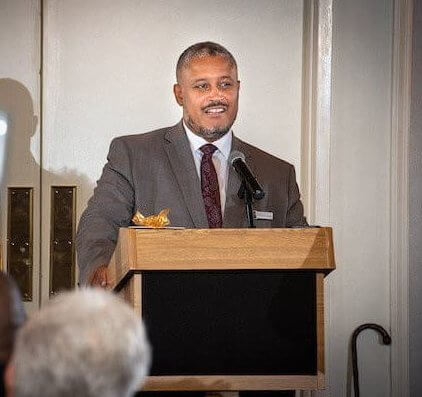When protests erupted after the deaths of Ahmaud Arbery, Breonna Taylor, and George Floyd, Walter D. Greason, Ph.D., associate professor and chair of the Department of Educational Counseling and Leadership, partnered with entities like the T. Thomas Fortune Cultural Center, the Duke University Forum for Scholars and Publics, the Library Company of Philadelphia, and others, to take part in educational discussions on a wide range of anti-racist and social justice topics. These dialogues, according to Greason, have raised public awareness about the Thirteenth and Fourteenth Amendments as the foundation of human rights and universal freedom in the U.S.
“Hundreds of educators have risen to the challenge to develop comprehensive curricula, dedicated to anti-racism and social justice, inspired by the successful campaign to remove monuments and landmarks dedicated to segregation and white supremacy,” Greason said.
Greason has also hosted professional development sessions based on these principles and practices. On Aug. 4, he led two workshops during the “STL in ATL” online conference hosted by the Woodward Academy, a pre-K through 12th grade college-preparatory school in the Atlanta metropolitan area. Greason’s presentations emphasized interactive technologies for elementary schools as well as social justice programs in secondary education.
On Aug. 5, Red Bank, New Jersey’s Two River Theater and T. Thomas Fortune Cultural Center jointly offered sessions on “The Art of Social Justice,” which provided curriculum guides, lesson plans, and professional learning resources for schools, community groups, and libraries. As part of this workshop series, Greason presented on “Justice and Reconciliation: Conversations Beyond Conflict,” which explored tools for educational leaders to facilitate difficult social justice conversations using honest, open dialogue.
Greason is also slated to join a panel of distinguished scholars including Douglas Massey, Ph.D., from Princeton University; Michael Rosenfeld, Ph.D., from Stanford University; and Laura Sullivan, Ph.D., from the Institute for Social Justice, on Aug. 12 to discuss “Housing, Segregation, and Racial Inequity in Essex County.” The discussion, sponsored by Congregation B’nai Jeshurun, Newark Academy, The CoCo, and the Greater Newark Conservancy, will highlight redlining and other discriminatory housing policies that limited Black mobility and economic opportunity in the 20th century, as well as the legacy of those policies that still exists today.
To learn more, contact Isabel Marmolejo, office coordinator, Department of Educational Counseling and Leadership, 732-571-3437.
Additional Resources

